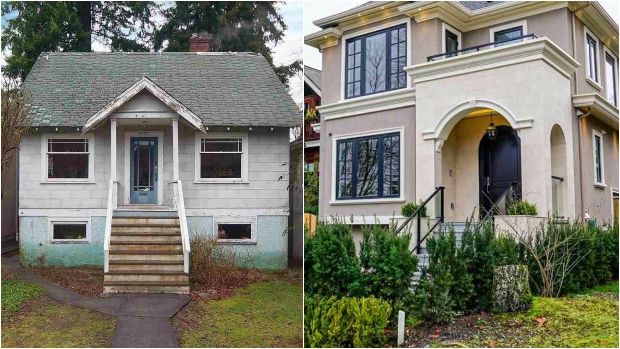
In this article I’m going to have a detailed breakdown of the Vancouver housing market for November 2016. Both Vancouver East and Vancouver West housing markets will be looked at. We will analyze single-family detached houses, resale houses only (brand new construction is will not be included).
Each graph goes back 3 years, from January 2013 to November 2016.
Find Vancouver houses for sale here.
Let’s start with an Average Sale Price of a detached houses in Vancouver in November 2016 and for the past 3 years (see graph below)
Vancouver East: $1,436,564 | +4.5% (change since November 2015)
Vancouver West: $3,827,771 | +8.0% (change since November 2015)
We can see a clear selling price drop since the record high selling prices in Spring and Summer of 2016. Part of the reason is the newly introduced “foreign investor tax” and part of the reason is a natural decline of the market (as we will see in the later graphs).
Next, let’s take a look at the Average Percent of Original Asking Price sellers got for their detached houses in November 2016 and for the past 3 years (see graph below)
Vancouver East: 94.1% | -9.5% (change since November 2015)
Vancouver West: 92.7% | -7.2% (change since November 2015)
We see a decline in the average precent of original price since November 2015. If we compare November 2016 to Spring and Summer 2016 there is a huge difference in the average percentage of original asking price. In April 2016 home sellers were getting 5-8% over their original asking price.
Now, let’s take a look at Average Number of Days It Takes to Sell a House in Vancouver in November 2016 and for the past 3 years (see graph below)
Vancouver East: 36 | +28.6% (change since November 2015)
Vancouver West: 48 | +2.1% (change since November 2015)
We can see that the average number of days a homes sits on the market went up since November 2015. However, that average is still very reasonable and well within the 10 year average. Right homes are selling relatively quickly.
Next, let’s take a look at the Total Number of Houses for Sale in Vancouver in November 2016 and for the past 3 years (see graph below)
Vancouver East: 701 | +100.3% (change since November 2015)
Vancouver West: 548 | +3.6% (change since November 2015)
East Vancouver has huge increase of total inventory on the market as compared to November 2015. In fact East Vancouver has unusually high number of available houses for sale compared to any month of any season including busy seasons in the Vancouver real estate market.
If the demented doesn’t meet the available inventory, which it doesn’t as we will see in graphs below than we can expect the prices to dip as they have, which we see in the graph above.
Next, let’s take a look at the Total Number of New Listings of Houses for Sale in Vancouver in November 2016 and the last 3 years (see graph below)
Vancouver East: 198 | +35.6% (change since November 2015)
Vancouver West: 111 | -29.3% (change since November 2015)
Again, not the best news for the sellers in East Vancouver as the number of new listings has increased substantially as compared to November 2015. It is very likely that without enough buyers for all of the new listings on the market in East Vancouver, prices will be coming down even more.
Now, lets take a look at the Total Number of Houses Sold in Vancouver in November 2016 and for the last 3 years (see graph below)
Vancouver East: 77 | -43.4% (change since November 2015)
Vancouver West: 65 | -55.8% (change since November 2015)
The number of sales for both Vancouver East and Vancouver West is about half of what they were in November last year.
What’s interesting is that Vancouver housing sales numbers were dropping 2 months before “foreign buyers tax”. The tax added breaks to already slowing down market.
Lastly, lets take a look at the Sales to Active Listings Ratio in November 2016 and for the last 3 years (see graph below)
Vancouver East: 0.110 | -71.7% (change since November 2015)
Vancouver West: 0.119 | -57.2% (change since November 2015)
Both Vancouver East and Vancouver West real estate housing markets are “buyers” markets. We see a shift from the first half of 2016 when the housing market was a strong “sellers” market. The transition into “buyers” market happened around July/August of 2016.
With the increase of inventory, a flood of new listings and low sales figures things are looking a bit grim for the near future of Vancouver housing market.
I hope you found this article helpful. If so, please, share it with someone who’s looking for a house in Vancouver or someone who owns a Vancouver home and would appreciate the extra information.
* All graphs and statistics are taken from the Real Estate Board of Greater Vancouver.

Pingback:Everything you need to know about Burnaby housing market - Dec 2016